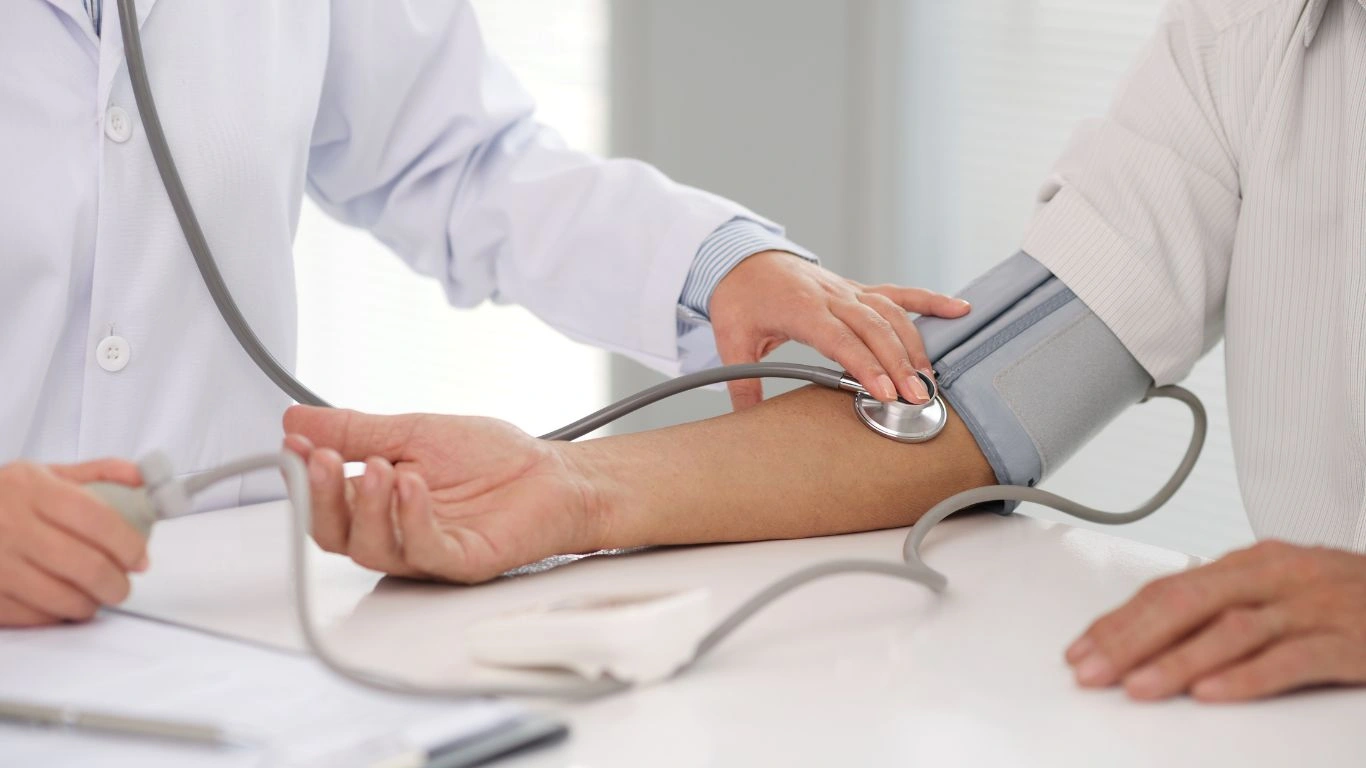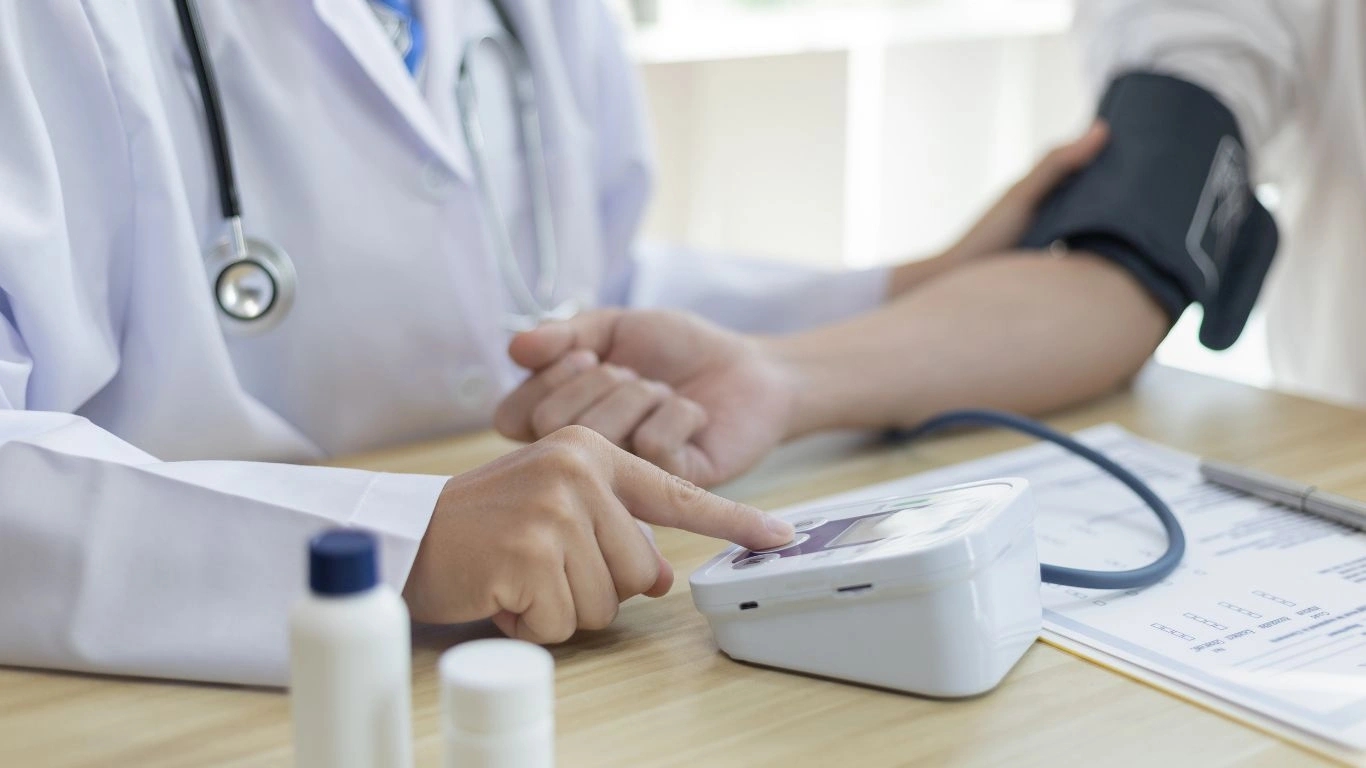How Fasting Can Help Stabilize Blood Pressure for Better Health
As a physician with years of experience in managing hypertension, one of the most interesting questions that I come across frequently from my patients and colleagues is: “Can fasting really impact blood pressure stability?” It’s a question that doesn’t just involve numbers but also touches on lifestyle choices, dietary habits, and even how we view health. After all, fasting is often seen as a trend, but its impact on our body, especially concerning blood pressure, is more than just a passing curiosity. Today, I want to dive deep into this topic, using my expertise and personal observations in hypertension management to shed light on the relationship between fasting and blood pressure.
The Science of Fasting and Its Effects on Blood Pressure

Fasting has been practiced for centuries for various reasons, including spiritual, health, and weight management purposes. But in recent years, the question of how fasting affects our blood pressure has started to attract more scientific attention. While it’s clear that fasting can offer various benefits, including weight loss and improved metabolic health, the way it interacts with blood pressure is a bit more complex.
For those of us managing hypertension or dealing with fluctuating blood pressure, it’s important to understand how fasting can influence blood pressure stability. Blood pressure is essentially the force of blood pushing against the walls of our arteries. When blood pressure is too high, it can cause serious damage to the heart and other organs. But if blood pressure is too low, it can also be problematic. So, when it comes to fasting, the goal isn’t necessarily to lower blood pressure drastically, but to find a balance.
What Happens to Your Blood Pressure During Fasting?
During a fasting period, several things happen in the body. First, your body starts to use stored energy sources, which leads to a reduction in insulin levels. Lower insulin can help improve vascular health, potentially leading to lower blood pressure. However, this can vary depending on the length of the fast and the individual’s health conditions. Some studies have suggested that intermittent fasting, in particular, may have a beneficial effect on blood pressure, helping it stabilize over time.
But fasting isn’t a one-size-fits-all solution. The impact of fasting on blood pressure stability can differ depending on factors such as the duration of the fast, the person’s overall health, and any underlying conditions such as obesity, diabetes, or kidney disease. For some, fasting might lead to a significant drop in blood pressure, while others may experience the opposite effect—blood pressure might spike, especially if the fasting is combined with stress or dehydration.
Does Fasting Impact Hypertension Patients Differently?

As a healthcare professional working with patients who have hypertension, I’ve noticed some important trends. For example, some of my patients have reported a decrease in their blood pressure after incorporating fasting into their lifestyle. This is especially true for those who practice intermittent fasting, which typically involves cycling between periods of eating and fasting. In my experience, patients who follow this routine often report feeling more energized and report a reduction in the need for medication to manage their blood pressure.
However, it’s crucial to approach fasting with caution, especially for people who have advanced hypertension or other cardiovascular issues. Rapid changes in diet, including fasting, may cause fluctuations in blood pressure. One of the risks that I’ve observed is the potential for dehydration. Fasting can sometimes lead to decreased fluid intake, which, in turn, may increase the risk of low blood pressure. This is particularly problematic for patients who are already on medications that lower blood pressure.
The Role of Sodium and Hydration During Fasting
Hydration plays a key role in managing blood pressure, especially during fasting periods. When you’re fasting, it’s easy to forget about staying hydrated. But when you don’t drink enough water, your blood volume can drop, which may cause a decrease in blood pressure. This is where things can get tricky for people with hypertension—especially if they’ve been prescribed medications that lower their blood pressure. It’s important to drink plenty of fluids during fasting periods to keep blood pressure stable.
Also, the role of sodium during fasting cannot be overlooked. Sodium helps to regulate fluid balance in the body, and fasting can alter your sodium levels. If you’re not careful, a fasting period might lead to a drop in sodium levels, which can cause low blood pressure, dizziness, and fatigue. I often recommend that my patients make sure to maintain a healthy level of electrolytes during fasting by including small amounts of salt in their diet when fasting, especially if they’re going long periods without food.
The Benefits and Risks of Fasting for Blood Pressure Stability

Like any health strategy, fasting comes with both benefits and risks, especially when it comes to blood pressure. As a clinician, my goal is always to help patients balance these factors and find a solution that works best for them. Let’s break down the potential benefits and risks:
- Benefits of Fasting on Blood Pressure: Many studies have shown that intermittent fasting can lead to a reduction in systolic and diastolic blood pressure. This may be due to improved insulin sensitivity, weight loss, and better vascular health. Additionally, fasting might help lower stress levels, which can contribute to more stable blood pressure.
- Risks of Fasting on Blood Pressure: For some people, fasting can have the opposite effect. Extended fasting or improper hydration can lead to low blood pressure (hypotension). This is especially true for those who are already on medications to lower blood pressure. Furthermore, fasting can cause stress, which may lead to spikes in blood pressure if not managed properly.
In my practice, I always tell my patients that it’s important to approach fasting in a controlled and informed way. Fasting isn’t a magic bullet for hypertension, but when done correctly, it can offer some real benefits for blood pressure stability.
How Long Should You Fast to See Benefits on Blood Pressure?

When it comes to fasting and blood pressure stability, one of the most common questions I get is about timing. How long do you need to fast to see an impact on your blood pressure? This is an important consideration, especially since fasting practices can range from intermittent fasting, which typically involves fasting for 12-16 hours, to longer fasting periods that last 24 hours or more.
In my experience, most patients who practice intermittent fasting (IF) often report seeing gradual improvements in their blood pressure after several weeks. This isn’t an immediate fix, but rather a long-term adjustment. Many of my patients start with a 12-hour fasting window, gradually extending it as they adjust. Over time, as the body adapts, they experience improved insulin sensitivity, reduced body fat, and ultimately, a more stable blood pressure reading.
Interestingly, longer fasts—24 to 48 hours—have shown promising results in some studies, especially for those with obesity or metabolic syndrome. However, I always remind my patients that prolonged fasting should be done under medical supervision, especially if they are already on blood pressure medication. This is because longer fasting periods can result in dramatic shifts in electrolytes and blood volume, which could lead to dangerous drops in blood pressure for some individuals.
The Role of Meal Timing and Blood Pressure Control
Another important factor to consider when discussing fasting and blood pressure is meal timing. It’s not just about what you eat, but when you eat it. The timing of your meals can have a significant impact on your blood pressure regulation.
In my practice, I’ve observed that patients who follow a routine of eating within an 8-hour window (a common practice in intermittent fasting) often see better control over their blood pressure. This is because eating smaller, more frequent meals during this window helps prevent blood sugar spikes and large fluctuations in insulin levels, both of which can contribute to blood pressure instability.
When patients eat larger meals or snack throughout the day, it can cause their insulin levels to fluctuate more dramatically, leading to blood pressure swings. With intermittent fasting, the body has a chance to recover and stabilize between meals, which can help with both weight management and blood pressure regulation. It’s important to note that the quality of the meals consumed during this eating window also matters. Nutrient-dense, whole foods are far more effective at supporting healthy blood pressure than processed foods, which can contain high levels of sodium and sugar.
Does Fasting Affect the Medications You Take for Hypertension?

As someone who works with patients managing hypertension, I can’t stress enough how important it is to be mindful of the medications you take when considering fasting. Blood pressure medications, such as ACE inhibitors, diuretics, and beta-blockers, can significantly impact how your body responds to fasting. These medications work by lowering blood pressure, and when combined with fasting, they may enhance the effect of fasting, sometimes too much.
For example, diuretics, which help eliminate excess fluid from the body, can lead to dehydration if not monitored properly during fasting. When dehydration occurs, it can lower blood volume and cause a dangerous drop in blood pressure. In my experience, patients who take diuretics need to be extra careful when fasting. They should ensure they stay hydrated and maintain electrolyte balance to avoid complications. I usually recommend that these patients check their blood pressure regularly and consult with their healthcare provider before starting any fasting regimen.
Similarly, beta-blockers, which reduce heart rate and lower blood pressure, may lead to dizziness or lightheadedness if combined with extended fasting periods. If you’re on this type of medication and thinking about fasting, it’s important to discuss it with your doctor to adjust medication dosages as necessary, especially during the initial phases of fasting when blood pressure changes are most noticeable.
Fasting, Weight Loss, and Blood Pressure
Weight loss is another critical factor in managing blood pressure, and fasting plays a role here as well. If you’ve ever struggled with high blood pressure, you know that excess weight can exacerbate the problem. Reducing body fat through controlled fasting and calorie restriction can help ease the burden on your heart and lower blood pressure over time.
Many of my patients who are overweight or obese have found that fasting not only helps them shed excess weight but also improves their blood pressure. There’s a significant amount of research that suggests even a modest weight loss of 5-10% of body weight can result in noticeable reductions in blood pressure.
While fasting can be an effective way to manage weight, I always advise my patients to combine it with other lifestyle changes, such as regular physical activity and a balanced, nutrient-rich diet. This approach ensures that the weight loss is sustainable and healthy, rather than just a short-term fix. I’ve found that patients who embrace a holistic approach to health—combining fasting with exercise, stress management, and quality sleep—tend to see the best results for blood pressure stability.
The Psychological Effects of Fasting on Blood Pressure

Finally, I’d like to touch on an often-overlooked factor when it comes to fasting: the psychological effects. Blood pressure isn’t just about physical health—stress and mental health play a huge role in its stability. And while fasting can provide some physiological benefits, it can also impact the way you feel mentally and emotionally.
Many of my patients report that fasting gives them a sense of control and focus, which can actually help reduce stress levels. Lower stress means lower cortisol levels, which can contribute to a more stable blood pressure. However, fasting can also trigger stress for others, especially if they find it challenging to stick to a fasting regimen or deal with hunger pangs. That stress, in turn, can spike blood pressure.
It’s essential to find a fasting schedule that works for you and your lifestyle. If fasting is causing anxiety or excessive stress, it may be worth reconsidering your approach or consulting with a healthcare provider to explore other methods of improving blood pressure.
What to Eat During Fasting to Support Blood Pressure Stability

When it comes to fasting, it’s not just about skipping meals—it’s about choosing the right foods during your eating window to support your overall health, including blood pressure stability. In my years of practice, I’ve seen how diet plays a pivotal role in helping patients manage their hypertension effectively, especially when combined with fasting.
One of the biggest mistakes I see in patients who try fasting is that they don’t always focus on the quality of the food they eat during their eating windows. Sure, they may skip meals and feel good about it, but when they finally break their fast, they opt for high-sodium or highly-processed foods that can derail any potential benefits fasting might offer. That’s why it’s crucial to prioritize nutrient-dense foods that nourish your body and support healthy blood pressure.
Foods That Help Support Blood Pressure
For stable blood pressure, it’s important to focus on a variety of foods that are rich in potassium, magnesium, and fiber. These nutrients can help counteract the effects of sodium, reduce inflammation, and support cardiovascular health.
- Leafy Greens: Vegetables like spinach, kale, and swiss chard are high in potassium, which helps balance sodium levels in the body. These greens also provide magnesium, which is essential for maintaining healthy blood vessels.
- Whole Grains: Foods like oats, quinoa, and brown rice are rich in fiber, which can help lower cholesterol and improve heart health. High-fiber diets have also been linked to lower blood pressure.
- Beets: Beetroot contains nitrates, which have been shown to help relax blood vessels and improve blood flow, potentially lowering blood pressure.
- Fatty Fish: Salmon, mackerel, and sardines are packed with omega-3 fatty acids, which have been shown to reduce blood pressure and inflammation in the body.
- Avocados: These are rich in potassium and healthy fats, which help lower blood pressure and support heart health.
- Berries: Blueberries, strawberries, and raspberries contain antioxidants, particularly flavonoids, that have been shown to lower blood pressure and improve blood vessel function.
Filling your plate with these heart-healthy foods during your eating window can make a big difference in managing blood pressure while fasting. And don’t forget to drink plenty of water throughout the fasting period. Staying hydrated is just as important as your food choices when it comes to blood pressure regulation.
Fasting and Lifestyle: A Holistic Approach to Blood Pressure

While fasting has proven to be a beneficial practice for many people with hypertension, it’s important to remember that it’s just one piece of the puzzle. When it comes to controlling blood pressure and maintaining long-term health, a holistic approach is key. Over the years, I’ve seen firsthand how lifestyle changes, in combination with fasting, can have a profound effect on blood pressure stability.
Exercise and Blood Pressure
Exercise is one of the most powerful tools you can use to lower and stabilize blood pressure. Even moderate exercise, like walking or cycling, can have a significant impact on your cardiovascular health. In my experience, many patients who combine regular physical activity with fasting tend to experience better outcomes in terms of blood pressure control.
Exercise helps to strengthen the heart, improve blood flow, and lower stress levels—all of which are crucial for managing hypertension. Plus, it helps with weight loss, which we know is another key factor in controlling blood pressure. The American Heart Association recommends at least 150 minutes of moderate exercise or 75 minutes of vigorous exercise per week, which can be easily broken down into smaller sessions throughout the week.
Stress Management and Its Impact on Blood Pressure
Stress can significantly affect blood pressure, so it’s important to manage it effectively. Over the years, I’ve found that patients who incorporate stress-reducing practices into their daily routine often have more stable blood pressure readings, especially when combined with fasting. Techniques like deep breathing, meditation, yoga, and even journaling can be incredibly effective for reducing stress and preventing blood pressure spikes.
Mindfulness practices are especially beneficial because they help activate the parasympathetic nervous system, which is responsible for promoting relaxation and reducing the fight-or-flight response that can increase blood pressure. I always encourage my patients to explore different stress management strategies to find what works best for them.
References and Further Reading
If you’re looking for more information about fasting, hypertension, and overall heart health, here are some useful resources:
Disclaimer
It’s important to note that while fasting may have positive effects on blood pressure, it is not a substitute for professional medical treatment. Always consult with a healthcare provider before beginning any new fasting regimen or making significant changes to your diet, especially if you have high blood pressure or are on medications for hypertension. This article is for informational purposes only and should not be used as medical advice.

Dr. Gwenna Aazee is a board-certified Internal Medicine Physician with a special focus on hypertension management, chronic disease prevention, and patient education. With years of experience in both clinical practice and medical writing, she’s passionate about turning evidence-based medicine into accessible, actionable advice. Through her work at Healthusias.com, Dr. Aazee empowers readers to take charge of their health with confidence and clarity. Off the clock, she enjoys deep dives into nutrition research, long walks with her rescue pup, and simplifying medical jargon one article at a time.







